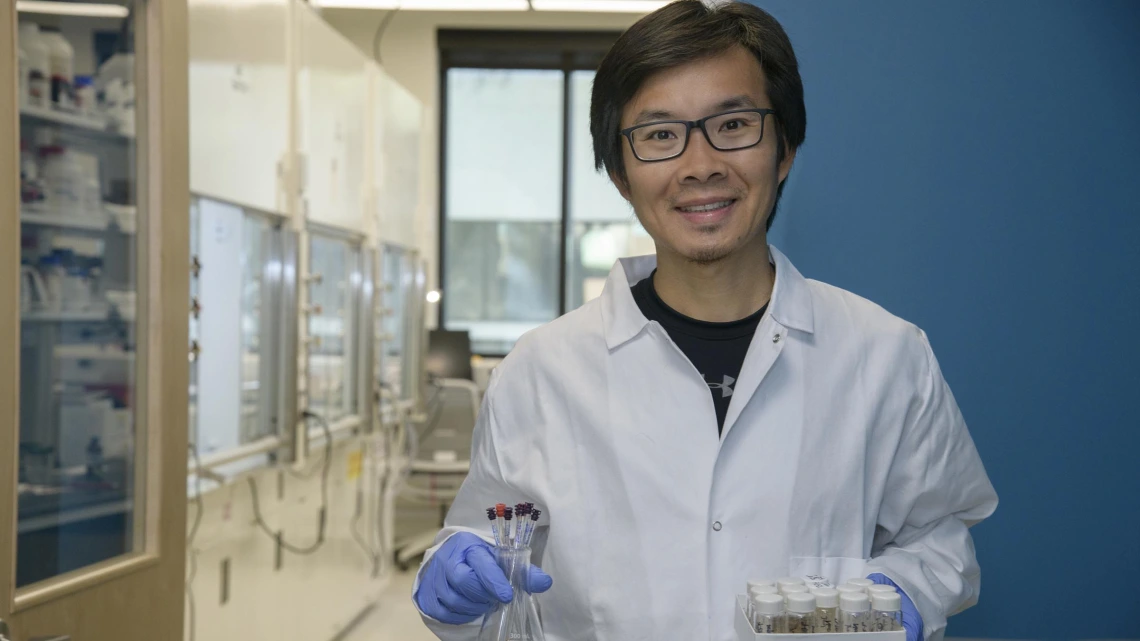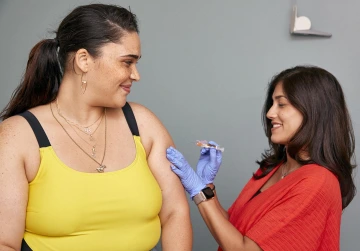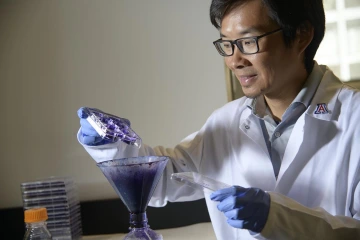A Virologist Answers Questions about COVID-19 and Flu
Health Sciences researcher Dr. Jun Wang says the world can be better prepared for the next viral outbreak by supporting infectious disease research now.

Jun Wang, PhD, uses cells infected with a virus to test an antiviral drug candidate. He says preparation for the pandemic of tomorrow requires working on antiviral drugs and vaccines today.
It’s fall, and with it comes the first flu season during the COVID-19 pandemic. That combination has created a rare public health challenge, and an opportunity for scientists who study viruses to share insight into the critical importance of their work.
Jun Wang, PhD, is an associate professor at the College of Pharmacy, where he heads a lab that develops antivirals targeting drug-resistant viruses and emerging viruses, including influenza viruses and SARS-CoV-2, which causes COVID-19.
He says the world needs to take infectious disease more seriously and support research into pathogens that have the potential to set off the next pandemic. He also has tips about how to lower the chance of contracting a virus.
It seems like COVID-19 took the world by surprise. Why weren’t coronaviruses on most people’s radars?
Generally, the news media don’t pay much attention to infectious disease until it causes a big problem.

The flu shot is the best defense against flu. Photo: Heather Hazzan, licensed under Creative Commons
For example, people only care about flu during flu season. The same thing is true for SARS-CoV-2. This is the third coronavirus to cause an epidemic among humans. The first was SARS-CoV-1 in 2003. The second was MERS coronavirus, Middle East respiratory syndrome, which emerged in Saudi Arabia. There was an outbreak in South Korea and in other places, and many people died from it.
The mortality rate was pretty high for both. Unfortunately, after these two outbreaks settled down, nobody paid attention to coronaviruses. No major efforts to continue developing vaccines or antibodies moved forward after that, because people think, “It’s already done. This outbreak disappeared.”
With SARS-CoV-2, now we are learning our lesson. We got hit really hard, and it doesn’t look like it’s going to disappear by itself. We need antivirals and we need vaccines. Now everybody is starting to pay attention. Now everybody’s talking about viruses.
We’re getting into flu season during the COVID-19 pandemic, the first time this has happened. What do we need to know about how our actions affect others?
“Getting your flu shot not only protects you, it protects people around you.”Jun Wang, PhD, associate professor, College of Pharmacy
If you are young and healthy, if you are infected with either flu virus or SARS-CoV-2, you may not have a severe consequence. Some people say, “I’m young, I’m healthy, I don’t care if I get COVID-19, nothing is going to happen.” This is a really selfish statement. You are in a society, right? You go to workplaces, you go to public places, you have family. It is really easy for you to pass a virus to a coworker, to your kids, to your parents. The people who are most vulnerable to viral infections are children, seniors and people with underlying diseases, because they have a compromised immune response.
The flu virus can easily spread, so if you live with children or seniors, you should be extremely careful. Getting your flu shot not only protects you, it protects people around you. To people who are against wearing a mask and practicing social distancing, you say, “Don’t just think about yourself. Think about others. You’re part of the team.”
There are many misconceptions about the flu shot. For example, can the flu shot cause people to get the flu?
No, that’s 100% not true. The flu shot is made of inactivated virus, not infectious virus. If you get a flu shot, you may have mild immune reactions, but you will not be infected by a flu shot. The best way to protect from flu infection is to get a flu shot.
Is it true that the flu shot isn’t very effective?
Some people argue, “I don’t need a flu shot because it’s not 100% protective.” That’s true, no flu vaccine is 100% effective. In most cases, it’s about 60% effective. Even if you get the flu shot, you may still get a flu infection, but this should not be used as an excuse not to get a flu shot.
Think about it: If you don’t get a flu shot, your protection is zero percent. If you get a flu shot, you have 60% protection. That’s pretty good, right?
The leading causes of death are chronic diseases like cancer. Why is it important to pay attention to infectious disease?
People talk about cancer almost every day, because it’s a chronic disease. It’s a long process. You might feel the pain every single day until you die. People think, “This is a big deal. We have to do something. Let’s try to solve this problem.”

Jun Wang, PhD
We cannot predict when the next pandemic is going to come, or what kind of pathogen might cause it. It could be a flu virus, it could be a Flavivirus like Zika or dengue, or it could be something nobody has ever heard of.
We know from past experience that there are a number of viruses that can potentially cause a pandemic similar to COVID-19. We should continue researching these potentially deadly viruses, so that when the next pandemic hits, we will be better able to develop antivirals and vaccines to protect us. We have to be prepared before it emerges.

